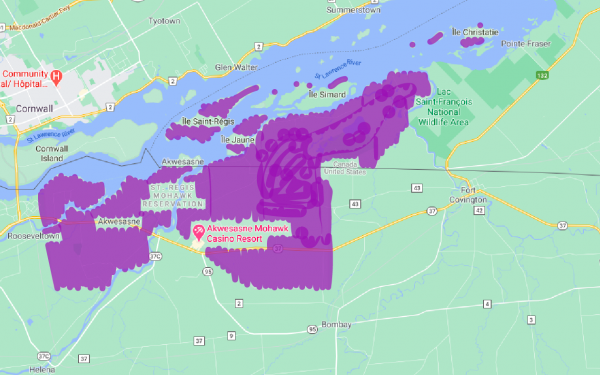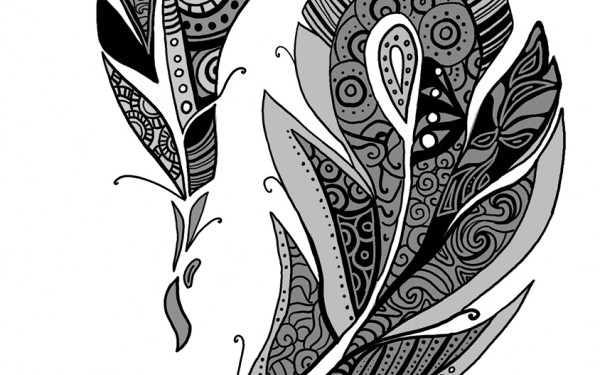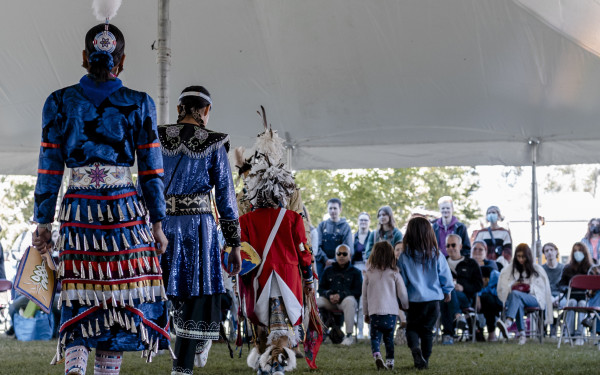Students crafting in support of the Mohawk Mothers
Cross-departmental collaboration raises awareness about historical injustices and on-going litigations
On Nov. 15, about 40 McGill University students gathered in support of the Kanien’keha:ka Kahnistensera, also known as the Mohawk Mothers. The students shared updates about the on-going legal proceedings and discussed why holding this space matters to them.
Kadia St-Pierre is a first year student at McGill with an interest in archeology. She was sitting with a few friends while drawing designs on purple patches of cotton. A couple of weeks ago she attended a “very powerful” Teach-In where she heard from them the Mohawk Mothers first hand.
“As a student, I didn't really know what I could do,” said St-Pierre. “I still don't think there's anything very impactful that I can do, but coming here and making patches and giving them to my friends is at least something.”
The Mohawk Mothers are a group of Indigenous women committed to protecting undiscovered evidence of unmarked graves within the framework of the Kaianere'kó:wa, or the Great Law of Peace, at the site of the former Royal Victoria Hospital, vacant since 2015.
In October of last year, the Mohawk Mothers won a temporary injunction stopping the excavation work, which is part of McGill University’s $850 million redevelopment project led by the Société québécoise des infrastructures (SQI). In the judgment analysis, Justice Gregory Moore considered a 2016 archeological report suggesting that “Mount Royal was used as a burial site before the arrival of Europeans.”
Following the injunction, a settlement agreement was reached between McGill University, the SQI and the Mohawk Mothers. The parties agreed on a panel of jointly selected archeologists. The panel released their recommendations in a report this summer which included remote-sensing techniques such as ground penetrating radar, LiDAR laser imaging and search dogs.
The Mohawk Mothers were back in Quebec Superior Court on Oct. 27 alleging that the panel’s recommendations were not being followed, such as potential anomalies being excavated too quickly. McGill University’s FAQ page on the matter stated that the panel “fulfilled and ended its mandate.” The panel will be consulted “in the event there is some unexpected discovery,” per the settlement agreement. Justice Moore adjourned the court without a decision. The next court date is scheduled for Dec. 1.
Many associations were part of organizing the crafting event including Divest McGill, the Nursing Undergraduate Society (NUS), the Arts Undergraduate Society and the Anthropology Student Association (ASA).
Maddie West, VP of Communications at McGill’s ASA hoped that this initiative would “spread awareness through symbols.”
She was pleased that the NUS also took part in the event.
“I’m really happy that this was cross-departmental,” said West. “One of the goals of this is to raise awareness in the sciences as well, rather than just the social sciences.”
Naomi Pastrana Mankovitz, a nursing student, represents the NUS in the McGill University Senate.
“Supposedly we are all on the same page so it just seems confusing to see that there is distress between the Mohawk Mothers and McGill,” she said. “Since it's part of our history, it's our responsibility to own up to that.”
Mankovitz is informing herself by getting her hands on the legal documents which are freely available at the courthouse.
“This is a concrete way to come together. There are so many difficult things happening in the world so it feels nice to have a little smidge of solidarity.”

_900_606_90.JPG)





